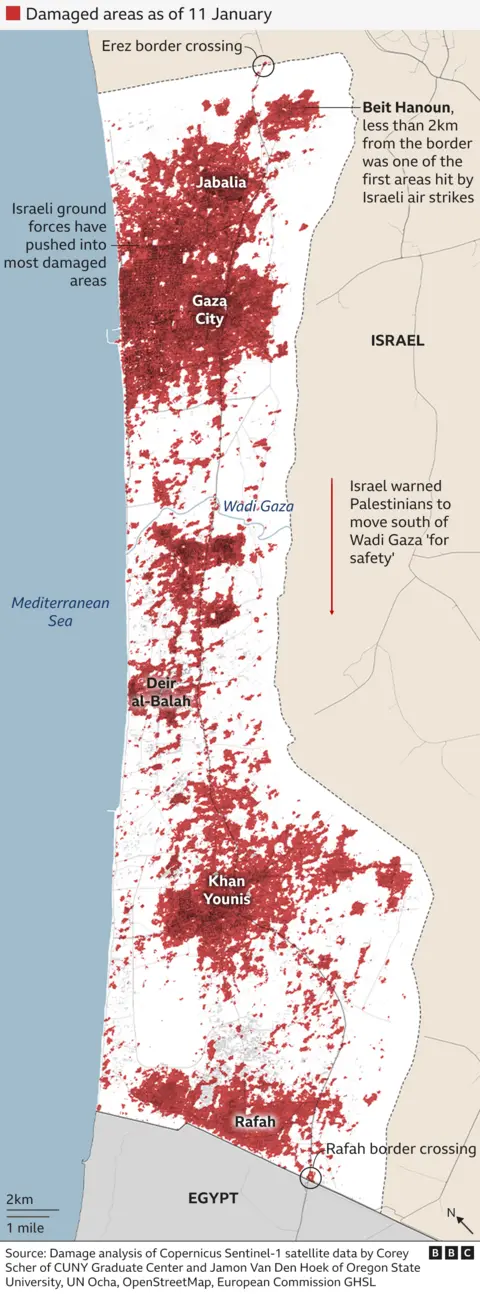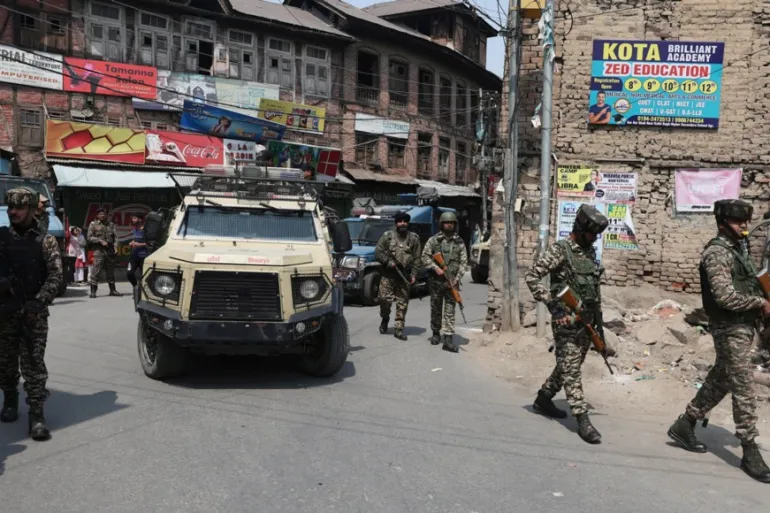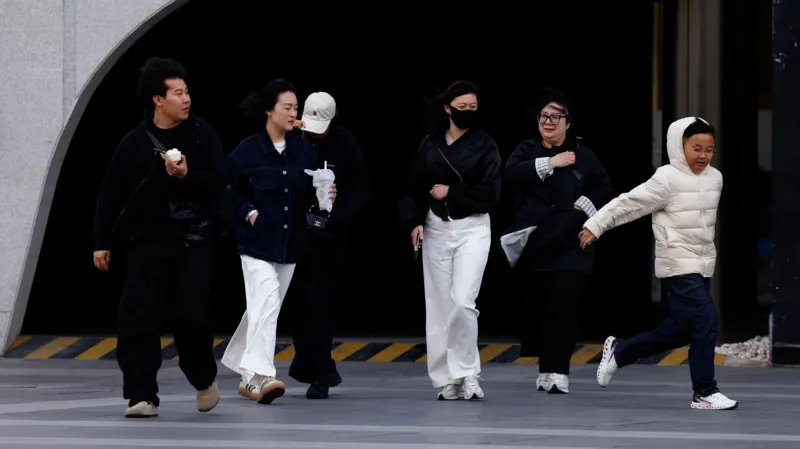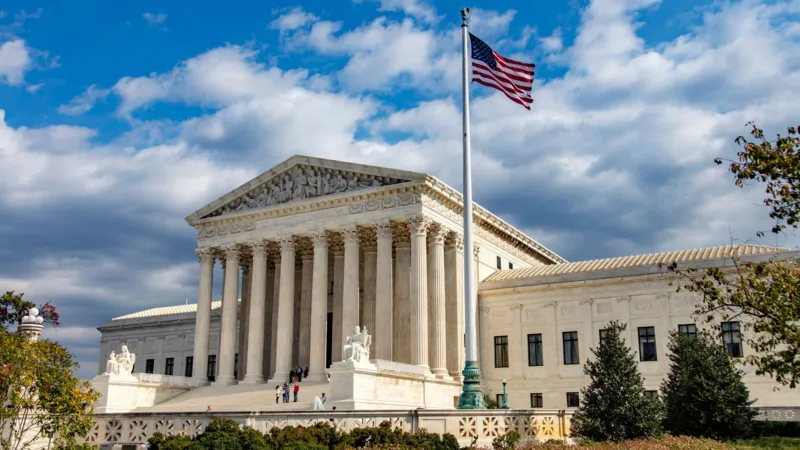Foreign News
Arab leaders approve $53bn alternative to Trump’s Gaza plan

A $53bn (£41.4 billion) reconstruction plan to rival President Donald Trump’s idea for the US to “take over Gaza” and move out more than two million Palestinians has been approved by Arab leaders at an emergency summit in the Egyptian capital Cairo.
“The Egypt plan is now an Arab plan,” announced the secretary general of the Arab League Ahmed Aboul Gheit at the end of this hours-long gathering.
Without referring specifically to President Trump’s ideas, he underlined that “the Arab stance is to reject any displacement, whether it is voluntary or forced”.
Egypt had produced a detailed blueprint, with a 91-page glossy document including images of leafy neighbourhoods and grand public buildings, to counter a US scheme labelled as a “Middle East Riviera” which shocked the Arab world and beyond.
What sets this new plan apart is it is not just about property development; its banners are politics and the rights of Palestinians.
In his opening remarks, Egypt’s President Abdul Fattah al-Sisi also called for a parallel plan alongside the physical reconstruction to move towards what is known as the two state solution – a Palestinian state alongside Israel. This is widely seen by Arab states, and many others, as the only lasting solution to this perpetual conflict, but it is firmly ruled out by Israel’s Prime Minister Benjamin Netanyahu and his allies.
This new plan proposes that Gaza would be run, temporarily, by a “Gaza management committee under the umbrella of the Palestinian government” comprised of qualified technocrats.
It glosses over the issue of what role, if any, Hamas, will play. There is a vague reference to the “obstacle” of militant groups and said this issue would be resolved if the causes of the conflict with Israel were removed.
Some Arab states are known to be calling for the complete dismantling of Hamas; others believe those decisions should be left up to the Palestinians. Hamas is said to have accepted it will not play a role in running Gaza but has made it clear that disarming is a red line.
Israel’s Prime Minister Benjamin Netanyahu, who has described President Trump’s plan as “visionary”, has repeatedly ruled out any future role for Hamas, but also for the Palestinian Authority.

The other sensitive issue of security was dealt with by calling on the UN Security Council to deploy international peacekeepers.
And a major international conference will be held next month to raise the huge sums of money necessary for this rebuilding project.
Wealthy Gulf states appear willing to foot some of the colossal bill. But no one is ready to invest unless they are absolutely convinced buildings won’t come crashing down in another war.
A fragile ceasefire which now seems to be on the brink of collapse will only amplify that hesitation.
This new Arab plan to rebuild Gaza would unfold in three phases including an initial period of about six months, called the early recovery stage, to start clearing the massive amounts of rubble as well as unexploded ordinance. Two subsequent stages would last several years.
During this time displaced Palestinians, said to number 1.5 million, would be housed in temporary containers. Photographs in the glossy brochure present them as well-built and designed housing units set in pretty landscaped areas.
President Trump continues to wonder aloud “Why wouldn’t they want to move?” His description of Gaza as a “demolition site” underlines how the territory lies in utter ruin. The UN says 90% of homes are damaged or destroyed.
All the basics of a life worth living, from schools and hospitals to sewage systems and electricity lines, are shredded.

The US President deepened the shock and anger around his ideas when he posted an AI generated video of a golden Gaza on his Truth Social account which featured a shimmering statue of himself, his close ally Elon Musk enjoying snacks on the beach, and he and the Israeli leader Benjamin Netanyahu sunning themselves, shirtless. All to a catchy tune, with lines like “Trump Gaza is finally here”.
“They had President Trump in mind,” remarked one Western diplomat who attended a briefing about Egypt’s plan at the foreign ministry in Cairo. “It’s very glossy and very well-prepared.”
Cairo’s proposal is said to have drawn on a wide range of expertise, from World Bank professionals on sustainability, to Dubai developers on hotels.
There are also lessons learned from other ravaged cities which rose from the ruins including Hiroshima, Beirut, and Berlin. And the proposed designs are also influenced by Egypt’s own experience in developing its “New Cairo”, its grand megaproject which has seen a new administrative capital rising from the desert – at great expense.
The American President has said he won’t “force” his ideas on anyone but still insists his plan is the one “that really works”.
Now it is up to the Arab states and their allies to prove that their plan is the only plan.
[BBC]
Foreign News
Three rebels, one Indian soldier killed in Kashmir gun battles

At least three suspected rebel fighters and one Indian soldier have been killed in separate firefights in Indian administered Kashmir less than a week after Interior Minister Amit Shah visited the disputed territory.
The Indian army said on Saturday that Indian soldiers killed three fighters in a gun battle that began on Wednesday in a remote forest in Kishtwar in southern Kashmir.
Senior Indian army official Brigadier JBS Rathi said troops had displayed “great tactical acumen”.
“In the gun battle, three terrorists were neutralised,” he told reporters on Saturday in a commonly used term for rebels opposed to Indian rule in Kashmir.
Weapons and “war-like stores” were recovered from the site, the army’s White Knight Corps posted on social media platform X.
A soldier was killed in a separate incident late on Friday night in Sunderbani district along the Line of Control (LoC), the de facto border that cuts Indian-administered Kashmir into two.
The White Knight Corps said on X troops had “foiled an infiltration attempt” there.
Muslim-majority Kashmir has been divided between nuclear-armed rivals India and Pakistan since their independence in 1947, with both claiming the territory in full but governing only part of it.
India has an estimated 500,000 soldiers deployed in the territory after an armed uprising against Indian rule in the late 1980s.
Thousands of people, most of them Kashmir civilians, have been killed as rebel groups have fought Indian forces, seeking independence for Kashmir or its merger with Pakistan.
In 2019, a report by the Office of the United Nations High Commissioner for Human Rights accused India of human rights violations in Kashmir and called for a commission of inquiry into the allegations. The report came nearly a year after the then UN human rights chief Zeid Ra’ad Al Husseincalled for an international investigation into abuses in the Muslim-majority region.
Last month, four police officers and two suspected rebels were killed in the region in a clash that also wounded several police officers.
The territory has simmered in anger since 2019 when Prime Minister Narendra Modi ended the region’s semi-autonomy and drastically curbed dissent, civil liberties and media freedoms while intensifying military operations.
Thousands of additional troops, including special forces, were deployed across southern mountainous areas last year following a series of deadly rebel attacks that killed more than 50 soldiers over three years.
India regularly blames Pakistan for pushing rebels across the LoC to launch attacks on Indian forces.
[Aljazeera]
Foreign News
Hundreds of flights cancelled in China as strong winds hit capital

Hundreds of flights have been cancelled and trains suspended as gales hit Beijing and northern China today [Saturday].
By 11:30 local time (03:30 GMT) today, 838 flights had been cancelled at the capital’s two major airports, according to the news agency Reuters.
Wind gusts of up to 93mph (150kph) – the strongest in the Chinese capital for more than half a century – are set to continue through the weekend, forcing the closure of attractions and historic sites.
Millions were urged to stay indoors on Friday, with some state media outlets warning that people weighing less than 50kg may be “easily blown away”.
Train services, including the airport’s express subway line and some high-speed rail lines, have been suspended.
Parks were also shut, with some old trees reinforced or trimmed in preparation – but almost 300 trees have already fallen over in the capital.
A number of vehicles were damaged, but no injuries were reported. In Beijing, most residents followed authorities’ advice to stay indoors after the city warned 22 million residents to avoid non-essential travel.
“Everyone in Beijing was really nervous about it. Today there are hardly any people out on the streets. However, it wasn’t as severe as I had imagined,” a local resident told Reuters.
Meanwhile, a businessman from the Zhejiang province, near Shanghai, had his flight home cancelled.
“Because of the severe winds, all flights scheduled for last night and today were cancelled. So I will probably rebook my flight in a couple of days. I’m now basically stranded in Beijing,” he said.
The strong winds are from a cold vortex system over Mongolia and are expected to last through the weekend.
Winds bringing sand and dust from Mongolia are routine in spring, but climate change can make storms stronger and more severe.
Beijing issued its first orange alert for strong winds in a decade, with the strongest winds expected to arrive on Saturday.
China measures wind speed on a scale that goes from one to 17. A level 11 wind, according to the China Meteorological Administration, can cause “serious damage”, while a level 12 wind brings “extreme destruction”.
The winds this weekend are expected to range from level 11 to 13, with conditions expected to ease by Sunday.
[BBC]
Foreign News
US top court orders Trump to return man deported to El Salvador in ‘error’

The US Supreme Court has ordered the Trump administration to facilitate the return of a Maryland man, who was mistakenly deported to El Salvador’s notorious mega-jail.
The Trump administration had conceded that Kilmar Abrego Garcia was deported by accident, but appealed against a federal court’s order to return him to the US.
On Thursday, in a 9-0 ruling, the Supreme Court declined to block the lower court’s order.
The judge’s order “requires the Government to ‘facilitate’ Abrego Garcia’s release from custody in El Salvador and to ensure that his case is handled as it would have been had he not been improperly sent”, the justices ruled.
(BBC)
-

 Business6 days ago
Business6 days agoColombo Coffee wins coveted management awards
-

 Features7 days ago
Features7 days agoStarlink in the Global South
-

 Features2 days ago
Features2 days agoRobbers and Wreckers
-

 Features4 days ago
Features4 days agoSri Lanka’s Foreign Policy amid Geopolitical Transformations: 1990-2024 – Part III
-

 Features7 days ago
Features7 days agoModi’s Sri Lanka Sojourn
-

 Midweek Review4 days ago
Midweek Review4 days agoInequality is killing the Middle Class
-

 Features6 days ago
Features6 days agoSri Lanka’s Foreign Policy amid Geopolitical Transformations: 1990-2024 – Part I
-

 Features5 days ago
Features5 days agoA brighter future …











